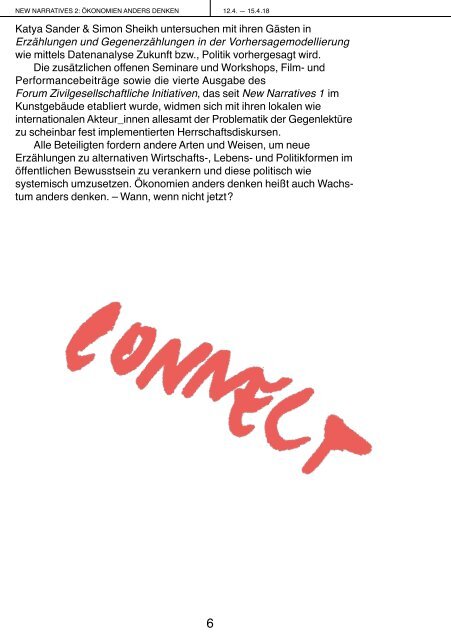RZ_NN2_Heft_A5_kleineDatei_5MB
You also want an ePaper? Increase the reach of your titles
YUMPU automatically turns print PDFs into web optimized ePapers that Google loves.
NEW NARRATIVES 2: ÖKONOMIEN ANDERS DENKEN<br />
6<br />
12.4. — 15.4.18<br />
Katya Sander & Simon Sheikh untersuchen mit ihren Gästen in<br />
Erzählungen und Gegenerzählungen in der Vorhersagemodellierung<br />
wie mittels Datenanalyse Zukunft bzw., Politik vorhergesagt wird.<br />
Die zusätzlichen offenen Seminare und Workshops, Film- und<br />
Performancebeiträge sowie die vierte Ausgabe des<br />
Forum Zivilgesellschaftliche Initiativen, das seit New Narratives 1 im<br />
Kunstgebäude etabliert wurde, widmen sich mit ihren lokalen wie<br />
internationalen Akteur_innen allesamt der Problematik der Gegenlektüre<br />
zu scheinbar fest implementierten Herrschaftsdiskursen.<br />
Alle Beteiligten fordern andere Arten und Weisen, um neue<br />
Erzählungen zu alternativen Wirtschafts-, Lebens- und Politikformen im<br />
öffentlichen Bewusstsein zu verankern und diese politisch wie<br />
systemisch umzusetzen. Ökonomien anders denken heißt auch Wachstum<br />
anders denken. – Wann, wenn nicht jetzt?<br />
NEW NARRATIVES 2: THINKING ECONOMICS DIFFERENTLY<br />
New Narratives 2: Thinking Economics Differently negotiates—in open<br />
seminars and workshops, lectures, discussions, performances, and<br />
films—sociopolitical fields of conflict. One such issue is the question of<br />
alternatives to a primarily economically shaped concept of growth,<br />
and how this might be realized through criteria of a social and cultural<br />
nature oriented to the common good.<br />
In her keynote speech Economic Growth and Social Inclusion,<br />
Gayatri Chakravorty Spivak questions, among other things, the<br />
equating of “development” and “state economic growth.” She identifies<br />
the accompanying opacity of a political and economic “culture” that,<br />
for example, enshrouds the effects of environmental destruction, war,<br />
and displacement and that is essentially responsible for inequality and<br />
social upheaval.<br />
So as to provide a focus of program content, we invited the<br />
political scientists Athena Athanasiou & Elena Tzelepis, the artist and<br />
curator Boris Ondreička, the artist Katya Sander together with the<br />
author and curator Simon Sheikh, to each conceptualize a one-day<br />
topic and to then discuss it with international guests as well as local<br />
civil initiatives.<br />
Pursuing the topic of What If We Don’t Make It? —The Economy of<br />
Doom, Boris Ondreička brainstorms, together with his guests, utopias<br />
and doomsday scenarios in order to speculate about ideas of family,<br />
community, and economics in relationship to laws and normative orders.<br />
In Performing “Crisis” as Critique: Acts and Arts of Remapping<br />
the Present beyond Economization, Athena Athanasiou & Elena Tzelepis<br />
view, with their guests, the limitations of the dominant expressions of<br />
the imaginary as engendered in Europe and globally through neoliberal<br />
forms of government, while at the same time forms of art/action as<br />
democratic participation emerge, opening up new possibilities for<br />
thinking and creating publicness. In Narratives and Counter-Narratives<br />
of Predictive Modeling, Katya Sander & Simon Sheikh explore, with their<br />
guests, how given data is analyzed to predict future behaviors—in<br />
short: politics.<br />
The additional open seminars and workshops, filmic and performative<br />
contributions, as well as the fourth edition of the Forum Civil Society<br />
Initiatives, which since New Narratives 1 has been established at the<br />
Kunstgebäude, along with all involved parties—including local<br />
and international participants—will address problems related to the<br />
counterreading of the seemingly firmly implemented discourses<br />
on governance.<br />
All involved individuals are demanding other ways of anchoring in<br />
public consciousness new narratives on alternative forms of economics,<br />
life, and politics, and ways of applying these narratives both politically<br />
and systemically. Thinking economics differently also means thinking<br />
growth differently.—If not now, then when?<br />
7<br />
INTRO


